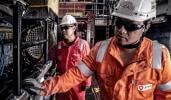6
Fabrice Sanders swapped his job in accountancy for a more exciting around-the-world life as an engineer and technician on board seismic survey vessels. It's a career that's always full of surprises, he explains.
“At the beginning of my working life I was an accountant at the Government,” remembers Belgium-born Fabrice Sanders. “But, as a job, it didn't really appeal to me.”
What definitely did appeal to Fabrice was travel which, ironically, put him on the path to a new career as a senior technician and engineer on board seismic survey vessels around the world. “I visited Thailand and heard lots of people talking about the offshore oil and gas industry,” he says. “Until that point, I didn't know anything about oil and gas because you go to the petrol station, you fill up your car... and that's it. You don't give it a second thought.”
Yet the more he found out about the sector, the more it intrigued him; and he certainly imagined it would be more rewarding than accountancy. So Fabrice gave up his Government job and later, in 2001, began studying electromechanical engineering at Haute École Roi Baudouin (HERB) in Belgium, graduating in 2004. In 2005, he finally achieved his ambition of entering the oil and gas industry, working offshore worldwide as a senior technician with geophysical services company, CGG.
Perks of the job
After being made redundant in 2014, Fabrice became a freelance contractor, working for – among others – Boskalis as an electronic and instrumentation technician on dredging operations in Portsmouth, UK; VBW Vermessungsbüro Weigt, as a hydrographic surveyor detecting unexploded ordnance (UXO) in the North Sea; and SeaOwl Energy Services as a seismic surveyor, providing UXO detection and 3D seismic data acquisition for an offshore wind farm project.
It's been an exciting and enjoyable career. “I love my job,” he says enthusiastically. “In offshore, it's a different life. I work with major companies, get good benefits, a good salary and I visit many places: Mexico, Australia, Europe, etc. In fact, so far I've been to 42 countries around the world! And on board survey vessels I work with people of all nationalities. That's interesting because we're together 24/7 for around five weeks at sea; and, although we are all different, we become a team – a family.”
Global footprint
Since 2017, Fabrice has been busy filling international seismic technician and survey engineer roles for Atlas Professionals. “It's easy working with Atlas because they have offices across the world,” he says. “For instance, my very first Atlas assignment was on the seismic vessel Geowave Voyager, via the company's Vic office. Atlas in Spain has found me seismic technician projects; while the UK office has found me work on European wind farm projects. And lately I received an assignment in Taiwan as a survey engineer through Atlas Professionals' Singapore office.”
Another recent Atlas assignment was in Malaysia as an OBC/OBN (Ocean Bottom Cable/Ocean Bottom Node) Observer on board the offshore support vessel, Surf Allamanda. This was a career highlight for Fabrice because it was the first time he'd worked with innovative ocean bottom node technology. It was challenging, however, because it meant deploying hundreds of nodes (autonomous recording devices which produce better seismic information) on the seafloor – and then recovering them to acquire their data. “After recovering the nodes we cleaned, checked and made sure they were working properly,” he says. “I really enjoyed it. Previously the seismic surveys I've worked on had deployed streamers (cables) – but that's expensive technology. I believe OBN is the future.” He continues: “I'd like it to be my future, anyway.”
High safety standards
But whatever the job he's doing, and whoever he's doing it for, Fabrice stresses how important it is to maintain the highest health and safety standards at all times. This is why he works in accordance with Atlas Professionals' 'Zero Harm' policy, an initiative that aims to boost safety presence and awareness for all Atlas personnel. “For example, as technicians, we need to use the proper tools and proper equipment and be totally focussed on our jobs,” he says. “If we don't use the proper tools, we can have a big problem; and if we lose focus, accidents can happen very easily.”
Fabrice recognises that oil and gas industry has been good to him over the last 14 years. He's comfortable and familiar with it, which is one reason why, given the choice, he would prefer to keep working in the sector; although, of course, surveyors are also essential for the growing number of wind farm projects around the world. “In this type of work, you never know what can happen next, or where it will be!” he concludes.
.png)
.png)


